浙江省2018届中考英语总复习第1部分教材知识梳理篇第12课时八上Modules9_10精讲试题外研版
- 格式:docx
- 大小:63.19 KB
- 文档页数:6
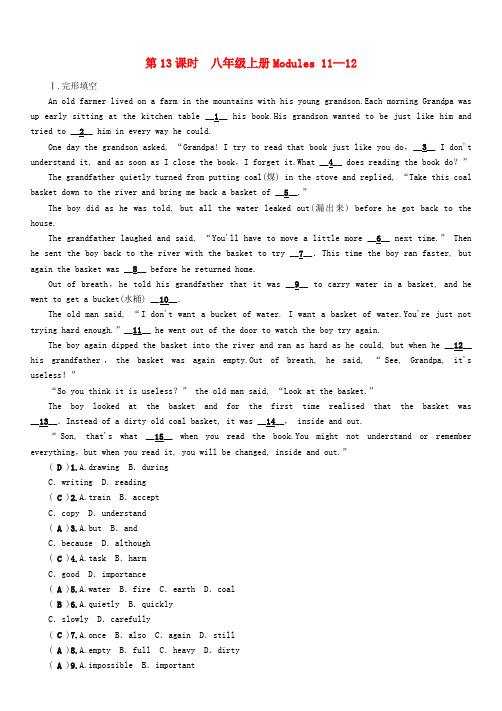
第13课时八年级上册Modules 11—12Ⅰ.完形填空An old farmer lived on a farm in the mountains with his young grandson.Each morning Grandpa was up early sitting at the kitchen table __1__ his book.His grandson wanted to be just like him and tried to __2__ him in every way he could.One day the grandson asked, “Grandpa! I try to read that book just like you do,__3__ I don't understand it, and as soon as I close the book,I forget it.What __4__ does reading the book do?”The grandfather quietly turned from putting coal(煤) in the stove and replied, “Take this coal basket down to the river and bring me back a basket of __5__.”The boy did as he was told, but all the water leaked out(漏出来) before he got back to the house.The grandfather laughed and said, “You'll have to move a little more __6__ next time.” Then he sent the boy back to the river with the basket to try __7__.This time the boy ran faster, but again the basket was __8__ before he returned home.Out of breath,he told his grandfather that it was __9__ to carry water in a basket, and he went to get a bucket(水桶) __10__.The old man said, “I don't want a bucket of water. I want a basket of water.You're just not trying hard enough.”__11__ he went out of the door to watch the boy try again.The boy again dipped the basket into the river and ran as hard as he could, but when he __12__ his grandfather,the basket was again empty.Out of breath, he said, “See, Grandpa, it's useless!”“So you think it is useless?” the old man said, “Look at the basket.”The boy looked at the basket and for the first time realised that the basket was __13__.Instead of a dirty old coal basket, it was __14__, inside and out.“Son, that's what __15__ when you read the book.You might not understand or remember everything,but when you read it, you will be changed, inside and out.”( D )1.A.drawing B.duringC.writing D.reading( C )2.A.train B.acceptC.copy D.understand( A )3.A.but B.andC.because D.although( C )4.A.task B.harmC.good D.importance( A )5.A.water B.fire C.earth D.coal( B )6.A.quietly B.quicklyC.slowly D.carefully( C )7.A.once B.also C.again D.still( A )8.A.empty B.full C.heavy D.dirty( A )9.A.impossible B.importantC.boring D.unnecessary( D )10.A.anyhow B.indeedC.therefore D.instead( A )11.A.This time B.Before longC.In a way D.In time( A )12.A.reached B.leftC.followed D.asked( B )13.A.wet B.differentC.broken D.new( C )14.A.light B.popular( D )15.A.means B.mattersC.takes D.happensⅡ.阅读理解There are many different kinds of disasters around the world.As an adult you know what to do during a disaster,but what about the children? Some adults think it would probably never happen to them,so they don't teach their children what to do.Before it's too late,here are ways to help you prepare your child for a disaster:Prepare:Always be prepared,that is the best advice for children.For example,when preparing for bad weather,get the tools you need,like candles,radios,food,water and medicine.Teach your child what is needed in certain disasters so that they know what is available for them,if ever needed.Plan:You should always have a plan for you and your child for any dangerous situation.Write out a simple list that they can read.The plan could start with “listen to an adult's advice and/or call 119”.Practice:Once you have got the correct safety tools and worked out the right plan,practise every few months.Practising what to do during a disaster with your child will help them if the time comes.Disasters can't be avoided but they can be lessened(减轻)once you are prepared and ready for one.( B )16.What does the underlined word “disasters” mean?A.命运 B.灾难 C.演习 D.倾销( C )17.What should adults teach children?A.When disasters will happen.B.Why disasters are dangerous.C.What to do for a disaster.D.How to avoid a disaster.( A )18.What is the correct thing to do for adults?A.Have positive conversations with children.B.Try not to talk about disasters with children.C.Make the children scared of disasters.D.Ask children lots of questions.( B )19.What's the most important thing for children?A.Always ask adults for help.B.Always be prepared for a disaster.C.Always listen to an adult's advice.D.Always remember where the tools are.Ⅲ.词汇运用A)用方框中所给词语的适当形式填空。
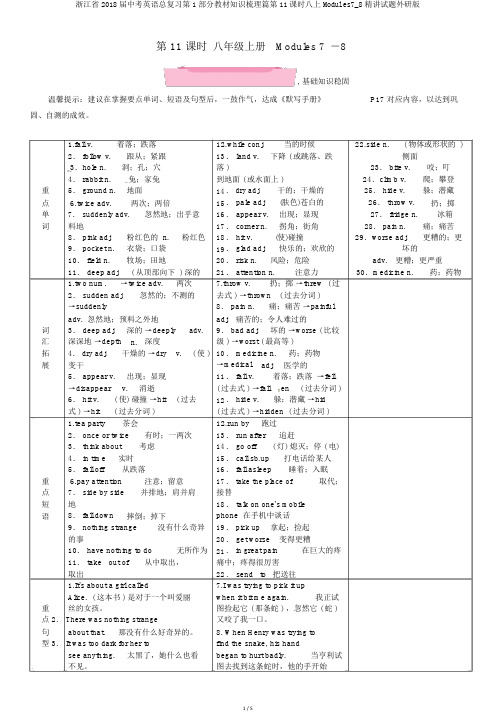
第 11 课时八年级上册Modules 7-8, 基础知识稳固温馨提示:建议在掌握要点单词、短语及句型后,一鼓作气,达成《默写手册》P17 对应内容,以达到巩固、自测的成效。
1.fall v. 着落;跌落12.while conj. 当的时候22.side n. ( 物体或形状的 )2. follow v. 跟从;紧跟13 . land v. 下降 ( 或跳落、跌侧面3.hole n. 洞;孔;穴落 ) 23. bite v. 咬;叮4. rabbit n. 兔;家兔到地面 ( 或水面上 ) 24.climb v. 爬;攀登重5. ground n. 地面14 . dry adj. 干的;干燥的25. hide v. 躲;潜藏点 6.twice adv. 两次;两倍15 . pale adj. (肤色)苍白的26. throw v. 扔;掷单7. suddenly adv. 忽然地;出乎意16 . appear v. 出现;显现27. fridge n. 冰箱词料地17 . corner n. 拐角;街角28. pain n. 痛;痛苦8. pink adj. 粉红色的 n. 粉红色18 . hit v. (使)碰撞29.worse adj. 更糟的;更9. pocket n. 衣袋;口袋19 . glad adj. 快乐的;欢欣的坏的10. field n. 牧场;田地20 . risk n. 风险;危险adv. 更糟;更严重11. deep adj. ( 从顶部向下 ) 深的21 . attention n. 注意力30.medicine n. 药;药物1.two num. →twice adv. 两次7.throw v. 扔;掷→threw ( 过2. sudden adj. 忽然的;不测的去式 ) →thrown ( 过去分词 )→suddenly 8. pain n. 痛;痛苦→painfuladv. 忽然地;预料之外地adj. 痛苦的;令人难过的词3. deep adj. 深的→deeply adv. 9. bad adj. 坏的→worse ( 比较汇深深地→depth n. 深度级 ) →worst ( 最高等 )拓4. dry adj. 干燥的→dry v. ( 使 ) 10 . medicine n. 药;药物展变干→medical adj. 医学的5. appear v. 出现;显现11 . fall v. 着落;跌落→fell→disappear v. 消逝( 过去式 ) →fall en ( 过去分词 )6. hit v. ( 使) 碰撞→hit ( 过去12 . hide v. 躲;潜藏→hid式 ) →hit ( 过去分词 ) ( 过去式 ) →hidden ( 过去分词 )1.tea party 茶会12.run by 跑过2. once or twice 有时;一两次13 . run after 追赶3. think about 考虑14 . go off ( 灯) 熄灭;停 ( 电)4. in time 实时15 . call sb.up 打电话给某人5. fall off 从跌落16 . fall asleep 睡着;入眠重 6.pay attention 注意;留意17 . take the place of 取代;点7. side by side 并排地;肩并肩接替短地18 . talk on one's mobile语8. fall down 摔倒;掉下phone 在手机中谈话9. nothing strange 没有什么奇异19 . pick up 拿起;捡起的事20 . get worse 变得更糟10. have nothing to do 无所作为21 . in great pain 在巨大的疼11. take out of 从中取出,痛中;疼得很厉害取出22 . send to 把送往1.It's about a girl called 7.I was trying to pick it upAlice. ( 这本书 ) 是对于一个叫爱丽when it bit me again. 我正试重丝的女孩。
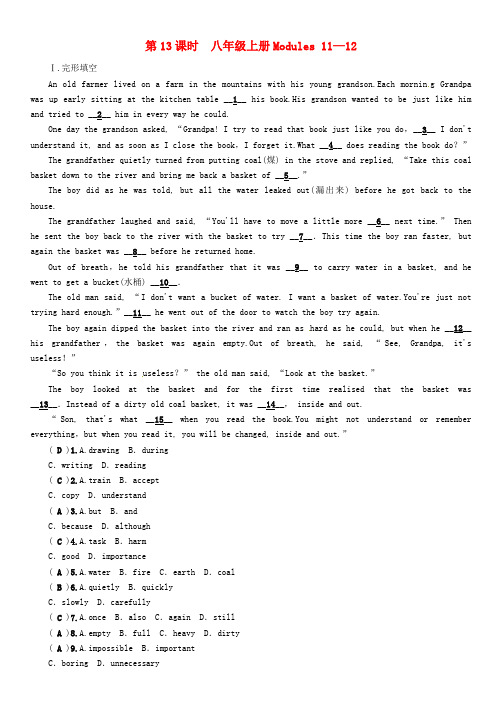
第13课时八年级上册Modules 11—12Ⅰ.完形填空An old farmer lived on a farm in the mountains with his young grandson.Each mornin g Grandpa was up early sitting at the kitchen table __1__ his book.His grandson wanted to be just like him and tried to __2__ him in every way he could.One day the grandson asked, “Grandpa! I try to read that book just like you do,__3__ I don't understand it, and as soon as I close the book,I forget it.What __4__ does reading the book do?”The grandfather quietly turned from putting coal(煤) in the stove and replied, “Take this coal basket down to the river and bring me back a basket of __5__.”The boy did as he was told, but all the water leaked out(漏出来) before he got back to the house.The grandfather laughed and said, “You'll have to move a little more __6__ next time.” Then he sent the boy back to the river with the basket to try __7__.This time the boy ran faster, but again the basket was __8__ before he returned home.Out of breath,he told his grandfather that it was __9__ to carry water in a basket, and he went to get a bucket(水桶) __10__.The old man said, “I don't want a bucket of water. I want a basket of water.You're just not trying hard enough.”__11__ he went out of the door to watch the boy try again.The boy again dipped the basket into the river and ran as hard as he could, but when he __12__ his grandfather,the basket was again empty.Out of breath, he said, “See, Grandpa, it's useless!”“So you think it is useless?” the old man said, “Look at the basket.”The boy looked at the basket and for the first time realised that the basket was __13__.Instead of a dirty old coal basket, it was __14__, inside and out.“Son, that's what __15__ when you read the book.You might not understand or remember everything,but when you read it, you will be changed, inside and out.”( D )1.A.drawing B.duringC.writing D.reading( C )2.A.train B.acceptC.copy D.understand( A )3.A.but B.andC.because D.although( C )4.A.task B.harmC.good D.importance( A )5.A.water B.fire C.earth D.coal( B )6.A.quietly B.quicklyC.slowly D.carefully( C )7.A.once B.also C.again D.still( A )8.A.empty B.full C.heavy D.dirty( A )9.A.impossible B.importantC.boring D.unnecessary( D )10.A.anyhow B.indeedC.therefore D.instead( A )11.A.This time B.Before longC.In a way D.In time( A )12.A.reached B.leftC.followed D.asked( B )13.A.wet B.differentC.broken D.new( C )14.A.light B.popularC.clean D.complete( D )15.A.means B.mattersC.takes D.happensⅡ.阅读理解There are many different kinds of disasters around the world.As an adult you know what to do during a disaster,but what about the children? Some adults think it would probably never happen to them,so they don't teach their children what to do.Before it's too late,here are ways to help you prepare your child for a disaster:Educate:It is always good to let your child know about possible disasters.This doesn't mean children have to live in fear.When teaching them about disasters,keep the conversation positive(积极的) by telling them there is a solution(解决办法) to the disaster.Keep the conversations short,allow for questions and answer honestly.Prepare:Always be prepared,that is the best advice for children.For example,when preparing for bad weather,get the tools you need,like candles,radios,food,water and medicine.Teach your child what is needed in certain disas ters so that they know what is available for them,if ever needed.Plan:You should always have a plan for you and your child for any dangerous situation.Write out a simple list that they can read.The plan could start with “listen to an adult's advice and/or call 119”.Practice:Once you have got the correct safety tools and worked out the right plan,practise every few months.Practising what to do during a disaster with your child will help them if the time comes.Disasters can't be avoided but they can be lessened(减轻)once you are prepared and ready for one.( B )16.What does the underlined word “disasters” mean?A.命运 B.灾难 C.演习 D.倾销( C )17.What should adults teach children?A.When disasters will happen.B.Why disasters are dangerous.C.What to do for a disaster.D.How to avoid a disaster.( A )18.What is the correct thing to do for adults?A.Have positive conversations with children.B.Try not to talk about disasters with children.C.Make the children scared of disasters.D.Ask children lots of questions.( B )19.What's the most important thing for children?A.Always ask adults for help.B.Always be prepared for a disaster.C.Always listen to an adult's advice.D.Always remember where the t ools are.Ⅲ.词汇运用A)用方框中所给词语的适当形式填空。
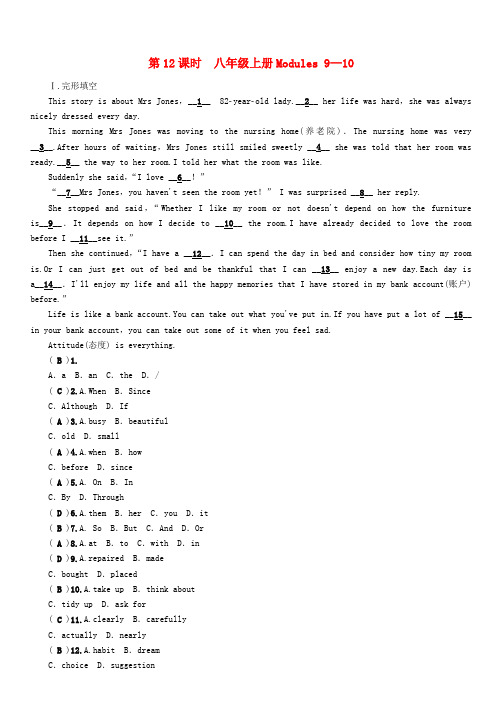
第12课时八年级上册Modules 9—10Ⅰ.完形填空This story is about Mrs Jones,__1__ 82yearold lady.__2__ her life was hard,she was always nicely dressed every day.This morning Mrs Jones was moving to the nursing home(养老院).The nursing home was very __3__.After hours of waiting,Mrs Jones still smiled sweetly __4__ she was told that her room was ready.__5__ the way to her room.I told her what the room was like.Suddenly she said,“I love __6__!”“__7__Mrs Jones,you haven't seen the room yet!” I was surprised __8__ her reply.She stopped and said,“Whether I like my room or not doesn't depend on how the furniture is__9__.It depends on how I decide to __10__ the room.I have already decided to love the room before I __11__see it.”Then she continued,“I have a __12__.I can spend the day in bed and consider how tiny my room is.Or I can just get out of bed and be thankful that I can __13__ enjoy a new day.Each day is a__14__.I'll enjoy my life and all the happy memories that I have stored in my bank account(账户) before.”Life is like a bank account.You can take out what you've put in.If you have put a lot of __15__ in your bank account,you can take out some of it when you feel sad.Attitude(态度) is everything.( B )1.A.a B.an C.the D./( C )2.A.When B.SinceC.Although D.If( A )3.A.busy B.beautifulC.old D.small( A )4.A.when B.howC.before D.since( A )5.A. On B.InC.By D.Through( D )6.A.them B.her C.you D.it( B )7.A. So B.But C.And D.Or( A )8.A.at B.to C.with D.in( D )9.A.repaired B.madeC.bought D.placed( B )10.A.take up B.think aboutC.tidy up D.ask for( C )11.A.clearly B.carefullyC.actually D.nearly( B )12.A.habit B.dreamC.choice D.suggestion( B )13.A.also B.stillC.ever D.only( A )14.A.gift B.messC.lesson D.journey( D )15.A.love B.courageC.kindness D.happinessⅡ.阅读理解Many hundreds of years ago,the moon was a mystery to people on the earth.What was that glowing ball came out at night? Why did it keep getting smaller,then larger? Why didn't it fall from the sky? Through the ages,people have tried to come up with answers.To the native people of Bolivia,in South America,the moon was a great chief who once lived on the earth.The Abaluyia people of Kenya,in Africa,believed the moon and the sun were brothers who fought in the sky.In other parts of the world,people believed they saw different pictures in the moon.The Haida Indians of Canada saw a woman carrying a bucket.The Chinese saw a toad.People in the past also used the moon to mark time as a kind of calendar.In fact,in some languages,the word for moon meant “month”.A Native American nation called the Sioux made a calendar of 13 moons,or months.Each moon had a name,such as Moon of Black Cherries,Moon of Green Corn,and Moon of Severe Cold.Though people of the past found the moon was helpful,mysterious and interesting,they didn't know much about it.They only knew what they could see with their own eyes.( B )16.Which name of the moon is NOT mentioned in the passage?A.Moon of Severe Cold.B.Moon of Red Trees.C.Moon of Black Cherries.D.Moon of Green Corn.( C )17.The underlined word “implement” probably means “ ________”.A.idea B.way C.tool D.habit( B )18.From this passage,we can know that ______.A.thousands of years ago,Galileo used his implement to look at the moonB.people in the past also used the moon to mark time as a kind of calendarC.people discovered that the darker areas in moon were hills and mountainsD.the native people of Bolivia thought that the moon and the sun were sistersⅢ.词汇运用A)用方框中所给词语的适当形式填空。
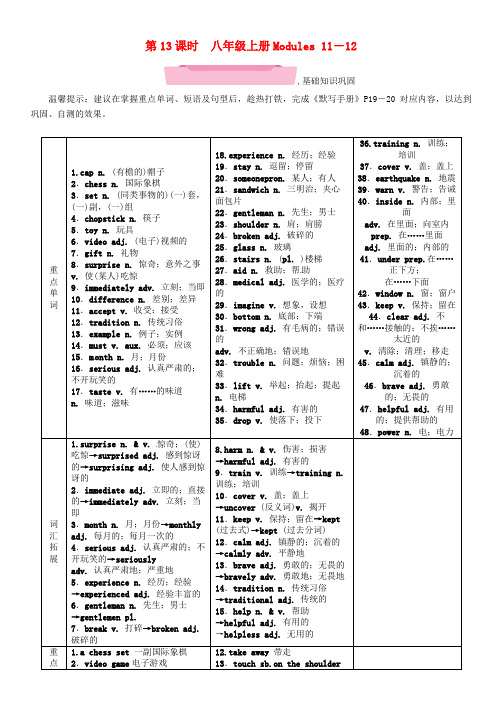
第13课时八年级上册Modules 11-12,基础知识巩固温馨提示:建议在掌握重点单词、短语及句型后,趁热打铁,完成《默写手册》P19-20对应内容,以达到巩固、自测的效果。
onth n.救助;帮助1.surprise n. & v..续表But he could have t ,重难词句选析1.surprise n . 惊奇;意外之事 v . 使(某人)吃惊(教材P88) 【点拨】(1)surprise 作名词,意为“惊奇;意外之事”。
常用短语如下: to one's surprise 令某人惊讶的是 in surprise 惊讶地(2)surprise 作动词,意为“使(某人)吃惊”。
如:That news surprised all of us.那个消息使我们所有人都感到吃惊。
【拓展】surprised 为其形容词形式,意为“感到惊讶的”。
be surprised to do sth.表示“惊奇地做某事”;be surprised at sth.表示“对某事感到惊讶”。
如:I was surprised at the news about his death.他去世的消息令我感到震惊。
We were surprised to hear the result.听到这个结果,我们感到吃惊。
【即时训练】用surprise的适当形式填空。
(1)To my __surprise__,she won the first prize.(2)You can't imagine how __surprised__ we were.(3)I was __surprised__ to see my parents at the airport.2.accept v. 领受;接受(教材P88)【辨析】accept与receiveaccept意为“接受;领受”,指经过考虑,自己愿意接受,动作本身是主动的,它的反义词是refuse(拒绝)。
第12课时八年级上册Modules 9-10,基础知识巩固温馨提示:建议在掌握重点单词、短语及句型后,趁热打铁,完成《默写手册》P18对应内容,以达到巩固、自测的效果。
wetter续表,重难词句选析1.prepare v. 准备;预备(教材P72)【点拨】prepare作动词,意为“准备”。
常见用法有:(1)prepare for sth./to do sth.准备做某事如:The students are busy preparing for the college entrance examination.学生们正忙着准备考大学。
(2)prepare sb.for sth./prepare sb.to do sth.使某人对某事做准备如:The teachers are preparing the students for the final examination.老师们正在让学生们准备期末考试。
(3)prepare sb.sth.为某人准备某物如:The hostess prepared us something tasty.女主人为我们准备了美味的东西。
(4)prepare sth.for +n. /v. ing 为……准备某物如:The farmers are preparing the field for planting fruits.农民们正在为种水果准备耕地。
(5)be prepared for/be prepared to do sth.准备做某事如:The students are well prepared for/to attend the sports meeting.学生们为参加运动会做好了充分的准备。
【即时训练】根据汉语提示补全句子。
My mother is __preparing__for__(为……做准备) my birthday dinner.2. increase n. & v. 增大;增长(教材P72)【点拨】(1)increase作动词时,常用以下结构:①increase by+倍数/百分数,意为“增加了……倍/百分之……”。
如:Traffic accidents have increased by three percent in the past year.去年交通事故已经增加了3%。
②increase to+具体数字,意为“增加到……”。
如:The population of the town has increased to 50,000.这个镇上的人口已经增加到5万。
(2)increase也可以作名词,意为“增加;增长”。
如:Some people voted for the tax increase.一些人投票赞成增税。
【即时训练】根据汉语意思完成句子。
在不到一年里,食品的价格上涨了百分之十。
Food prices __increased__by______10% in less than a year.3.although conj. 然而;尽管(教材P80)【点拨】although = though意为“尽管;虽然”,although比though更正式,二者可互换,但是也有所区别:(1)although和though引导的从句放在主句前后均可。
如:He often helps me with my English though/although he is quite busy.尽管他相当忙,但是还常常帮我学英语。
(2)although和though引导的从句不能与but,however连用,但可与yet,still连用。
如:Though/Although it was raini ng,we still went there.虽然下着雨,但我们还是去了那儿。
(3)though还可与别的词结合使用,如even though,as though等;although不可以。
如:I'll go and help them even though I stop my work.即使我停下自己的活不干,我也要去帮助他们。
(4)though可用作副词,放在词尾;although却不可以这样用。
如:He said he would come,he didn't,though.他说要来却没来。
【即时训练】根据汉语意思完成句子。
虽然他年轻,但是却懂得很多。
__Although/Though__he__ is young,he knows a lot.4.wish v. 但愿;希望(教材P80)【辨析】wish与hope两者都可表示“希望”,但用法上有相同与不同之处:(1)wish和hope都可接不定式作宾语。
如:We wish/hope to see the film.我们希望看这部电影。
(2)都能与介词for连用,后接名词或某些不定代词,表示“希望得到;祈求”。
如:Do you hope for peace?你希望和平吗?Do you wish for anything better?你希望得到更好的东西吗?(3)wish后可接双宾语表示祝愿,hope则不能。
如:I wish you success.我祝你成功。
(4)wish后可接复合宾语,即wish sb.to do sth.结构,hope则不能。
如:My father wishes me to be a pilot.我的父亲希望我成为一名飞行员。
(5)wish和hope都能接that引导的从句,但wish后的从句的谓语动词要用虚拟语气(动词用过去时或过去完成时,表示希望不大可能的事情发生),hope则用所需要的时态。
如:I wish I were taller.我希望我的个子再高一些。
I hope I will finish my homework in half an hour.我希望我能在半个小时内完成家庭作业。
【即时训练】用wish或hope填空。
(1)I __wish/hope__ to be a painter.(2)T hey __wish__ Jack to stay with them.(3)I __wish__ I hadn't bought the book yesterday.5. What's the weather like in America in winter,Betty?贝蒂,美国冬天的天气怎么样?(教材P80)【点拨】“What's the weather like (in+地点)?”是询问天气状况的常用句型。
其同义句型为“How is the weather (in+地点)?”。
回答时,常用“It's+表示天气的形容词.”。
如:—What's the weather like in Wuhan?=How is the weather in Wuhan? 武汉的天气怎么样?—It's hot.炎热。
【即时训练】第(1)题选词填空;第(2)题句型转换。
(1)—__What__(What/How) is the weather like today?—It's sunny.(2) It iscold in Harbin.(对画线部分提问)__How's__ the weather in Harbin?6.—But I don't like showers or windy weather.但是我不喜欢暴风雨或大风天气。
—Me neither.我也不喜欢。
(教材P80)【点拨】此句型中,“Me neither.”为非正式的简略表达形式,其正式的句型结构为:“Neither+be动词/助动词/情态动词+主语.”,表示“……也不”。
其中,neither作副词,意为“也不”,承接前一否定句构成否定倒装句。
如:My father didn't watch TV.Neither did my mother.我爸爸没有看电视,我妈妈也没看。
【拓展】neither还可以作代词,意为“(两者)都不”。
如:Neither of us felt like going out.我俩都不想外出。
—Which one would you like,tea or coffee?你喜欢哪一个,茶还是咖啡?—Neither.两个都不喜欢。
【即时训练】根据汉语意思完成句子。
他明天不去游泳,我也不去。
He won't go swimming tomorrow.__Neither__will__I__.,当堂练习检测Ⅰ.根据汉语意思完成句子。
1.——英格兰的十二月通常下雪吗?——通常不下,尽管今年下了相当多的雪。
—__Is__ it____snowy__ in England in December?—Not usually, although this year it snowed __quite__a__lot__.2.九月是去新英格兰游览的最佳时间。
The best time __to__visit__New England is in September.3.晚些时候可能会下雨,所以你要随身带一把雨伞。
It __may__ rain later, so take an __umbrella__ with you.4.带上你的照相机以便拍摄秋天的树木。
Bring your camera so that you can____take__photos__of__ the autumn trees.5.加利福利亚在太平洋海岸,终年天气晴朗。
California is on the Pacific coast,and the weather is fine __all__year__round__.6.夏季和秋季时常有暴风雨。
There are storms __from__time__to__time__ in summer and autumn.Ⅱ.用方框中所给单词或词语的适当形式填空。
每词仅用一次。
wet,pro bably,close down,cold,billion1.The population of the world is about seven __billion__.2.The factory __closed__down__ because of the bankruptcy(破产).3.Winter is __colder__ here than in England.4.Mary will __probably__ go to New York in the autumn.5.The Amazon Rainforest is one of the __wettest__ places in the world.Ⅲ.根据短文内容和所给中文提示,在空白处写出单词的正确形式。